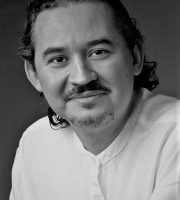by Tomás Q. Morín
My brothers wait for me with cigars in their mouths,
debating the price of cabbage, the virtues of sleep
and my sisters having just arrived, hang their shawls
in the hallway and then sit and redden their faces
over white cups of tea. The train whistles
and the sleeping boy beside me just stirs
long enough to touch his father’s leg, to point
out the window at the large flocks of men
swinging their picks, spading their way
to the noiseless center of an imagined market
in Beijing where they will buy the best silk
their good looks can get and then rose their cheeks
until they look like grandmothers on holiday
in the Near East.
Beyond the men, in the smoky
clods of dirt I can see the lost children of this land
sneaking behind the silent showers to peek
at the concrete and its people. I consider
how long their eyes wandered before they turned
and took chalk to paper, coal to wood.
How would you see the world after that,
would the night teach you anything about comfort,
would you still marvel at your red-faced mother
pulling her clay head from the mouth of an oven,
her hair overcome with the smells of new bread?
A girl drops her chalk, bends and picks up
a long feather of smoke with her nose
and then begins to pity everything from the black
throats of chimneys to the huffing trains
logging through the countryside the baked bones
of her fathers and mothers.
I brood and mouth
the words of a question I cannot ask, cannot
voice to the unclean air: O little ones, would you have
looked any longer or moved the chalk any slower
if you had known that one day you’d be loved again
and again by the words in a book or that I would crawl
under your sky on the morning of my birthday,
bundled tightly in the seat of my car, your drawings
in my lap and on the floor between my feet
the last pies—one apple, one cherry—my mother
made now beginning to tear their metal faces?
Last updated February 23, 2023




